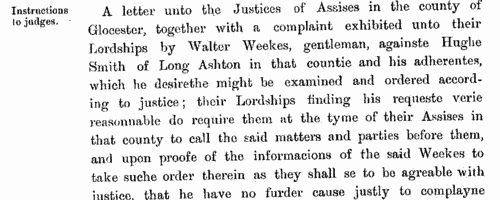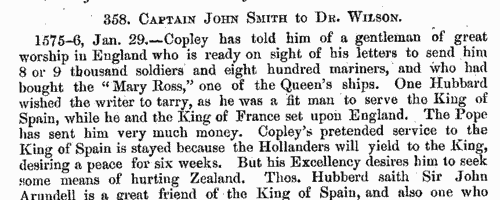Our indexes include entries for the spelling rawes. In the period you have requested, we have the following 93 records (displaying 1 to 10):
Liegemen and Traitors, Pirates and Spies
(1571-1575)
The Privy Council of queen Elizabeth was responsible for internal security in England and Wales, and dealt with all manner of special and urgent matters
| Sample scan, click to enlarge

|
Liegemen and Traitors, Pirates and Spies
(1580-1581)
The Privy Council of queen Elizabeth was responsible for internal security in England and Wales, and dealt with all manner of special and urgent matters
| Sample scan, click to enlarge

|
Cecil Manuscripts
(1572-1582)
Letters and papers of William Cecil lord Burghley, Lord Treasurer. Includes some other material as early as 1553. | Sample scan, click to enlarge

|
Suffolk householders
(1674)
Hearth tax was raised by assessing each householder on the number of chimneys to the dwelling. This provided a simple way to make a rough judgment as to the value of the dwelling: paupers were issued exemption certificates, but they too were listed at the end of each return. The returns were made by township, grouped by hundred. A complete copy of the hearth tax return for each shire was sent to the Exchequer: this is the return for Suffolk for Lady Day (25 March) 1674 (E 179/257/14) as printed in 1905 as Suffolk Green Book no xi, vol. 13. The numbers given are the numbers of hearths: where two or more people are grouped together with one number, it may be assumed that they were heads of separate households sharing a single building with that number of chimneys. | Sample scan, click to enlarge

|
 Masters of apprentices
(1756) Masters of apprentices
(1756)
Apprenticeship indentures and clerks' articles were subject to a 6d or 12d per pound stamp duty: the registers of the payments usually give the master's trade, address, and occupation, and the apprentice's name, as well as details of the date and length of the apprenticeship. 1 January to 11 September 1756. | Sample scan, click to enlarge

|
 Masters of Apprentices
(1759) Masters of Apprentices
(1759)
Apprenticeship indentures and clerks' articles were subject to a 6d or 12d per pound stamp duty: the registers of the payments usually give the master's trade, address, and occupation, and the apprentice's name, as well as details of the date and length of the apprenticeship. 1 January to 12 April 1759. | Sample scan, click to enlarge

|
 Masters of apprentices registered in Northampton
(1763) Masters of apprentices registered in Northampton
(1763)
Apprenticeship indentures and clerks' articles were subject to a 6d or 12d per pound stamp duty: the registers of the payments usually give the master's trade, address, and occupation, and the apprentice's name, as well as details of the date and length of the apprenticeship. There are central registers for collections of the stamp duty in London, as well as returns from collectors in the provinces. These collectors generally received duty just from their own county, but sometimes from further afield. The indentures themselves can date from a year or two earlier than this return. (The sample entry shown on this scan is taken from a Bristol return. Each entry has two scans, the other being the facing page with the details of the indenture, length of service, and payment of duty.) IR 1/54 | Sample scan, click to enlarge

|
 Masters of apprentices registered in Northamptonshire
(1770) Masters of apprentices registered in Northamptonshire
(1770)
Apprenticeship indentures and clerks' articles were subject to a 6d or 12d per pound stamp duty: the registers of the payments usually give the master's trade, address, and occupation, and the apprentice's name, as well as details of the date and length of the apprenticeship. There are central registers for collections of the stamp duty in London, as well as returns from collectors in the provinces. These collectors generally received duty just from their own county, but sometimes from further afield. The indentures themselves can date from a year or two earlier than this return. (The sample entry shown on this scan is taken from a Durham return. Each entry has two scans, the other being the facing page with the details of the indenture, length of service, and payment of duty.) IR 1/57 | Sample scan, click to enlarge

|
Gloucestershire Freeholders and Tenants: Chedworth
(1776)
The election of a knight of the shire to represent the county of Gloucester in Parliament began 6 May and continued until 17 May 1776, the Hon. George Cranfield Berkeley and William Bromley Chester, esq., being the candidates. The franchise was for adult males possessing freehold worth 40s or more per annum. This poll book lists all voters, arranged by hundred and then by township according to the place where their freehold lay. The voter's full name is given (surname first); place of abode; of what the freehold consists (such as messuage and lands); in whose tenure; and how his vote was cast. | Sample scan, click to enlarge

|
 Masters of clerks and apprentices
(1783) Masters of clerks and apprentices
(1783)
Apprenticeship indentures and clerks' articles were subject to a 6d or 12d per pound stamp duty: the registers of the payments usually give the master's trade, address, and occupation, and the apprentice's name, as well as details of the date and length of the apprenticeship. 23 June to 31 December 1783. IR 1/32 | Sample scan, click to enlarge

|
Research your ancestry, family history, genealogy and one-name study by direct access to original records and archives indexed by surname.












